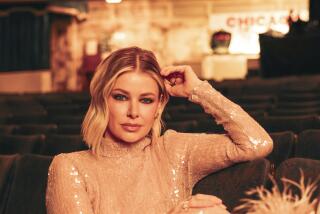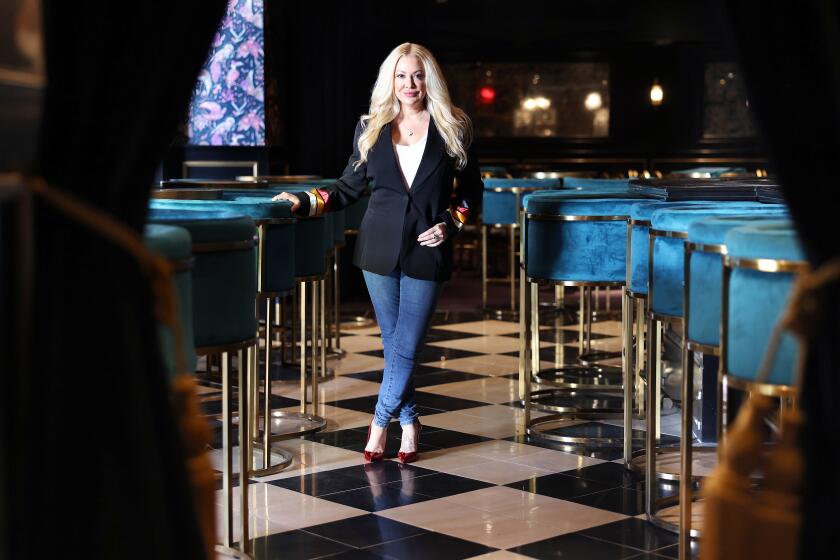The Actress: Sherie Rene Scott on truth and artifice in ‘Everyday Rapture’
NEW YORK — Just before Sherie Rene Scott debuted in “Everyday Rapture” at off-Broadway’s Second Stage last spring, she panicked.
“I thought to myself, ‘Oh, God, this could go really, really badly,’ ” the 43-year-old actress recalls about a musical fable that borrows events from her own life as a religious young woman growing up in Kansas and dreaming of stardom. “I’m going to make an ass of myself. Because the character is an ass. And people are going to confuse me with the character. People could be so offended that they wouldn’t want to ever associate with me again. And I said to myself, ‘Oh, well.’ ”
Scott, who sends herself up in the show as the “semi, semi, semi-star” of such shows as “Aida,” “Dirty Rotten Scoundrels” and “The Little Mermaid,” now has the luxury of that seemingly cavalier “Oh, well.” She sits atop a batch of nearly universal rave reviews for the show, in which she not only stars but she also co-wrote with Dick Scanlan. And since the play transferred to Broadway’s Roundabout Theatre last April as a last-minute replacement for the aborted revival of “Lips Together, Teeth Apart,” Scott has been further vindicated with two Tony nominations for the show: leading actress in a musical and best book of a musical, an honor she shares with Scanlan.
Ben Brantley, writing in the New York Times, described “Everyday Rapture” as “a sensational diva-as-trash-goddess show” and Scott as a “brass-and-butter” Bette Midler, “one of those rare, wry and passionate performers who bring out the inner show queen in people, even folks who didn’t know they had one.”
Scott’s fears were not unfounded. Before the show opened at Second Stage, it was subject to walkouts and the occasional fist raised at the hard-driving performer, flanked by singers Lindsay Mendez and Betsy Wolfe, and backed by an onstage band. That response was not entirely unexpected given that when Scott and Scanlan began to write nearly 10 years ago, one of the main goals of “Everyday Rapture” was, in her words, “to make abortion and AIDS funny, sexy and entertaining. And we did!”
Exactly how the nervy pair managed to do this lies within a larger construct of Scott’s spiritual journey from a Topeka childhood to Broadway stardom mapped through a pseudo-memoir with songs, ranging from show tunes to Tom Waits to U2 to TV’s Mr. Rogers. Among the seminal characters are a beloved Judy Garland-loving cousin who dies of an HIV-related illness, an encounter with a magician who — “poof” — makes her virginity disappear and a funny, ego-bruising duel with a young fan of her “Aida” character.
Since Scott is the daughter of a mother raised as a Mennonite, the show is also haunted by an ambivalence between self-expression and self-abnegation, between the narcissism of show business and the desire to be of service.
“I was searching, searching, searching to be one with God, while a lot of other people clapped,” the onstage Sherie Rene Scott says to the audience of her conundrum.
That struggle is central to who the real Scott is, Scanlan says. “Sherie has a huge amount of ambition that is commensurate with her talent. She’s almost vaudevillian in her understanding of an audience. And yet she has a contemporary social conscience that drives her to a dialogue of who we are and where we are going as a society.”
Those contradictions are apparent as Scott, at the American Airlines theater, sits perched on a day bed in a dressing room dominated by a large, dreamily lit photo of her husband, Kurt Deutsch, a record executive, and their 4-year-old son, Elijah. She has a nervous energy, her nonstop, circular chatter punctuated by “ums” and “uhs” as she plays with her straw-blond hair and steals sidelong glances at the mirror behind her. On any other person, the tics might be irritating. But on her, they are charming. Dressed in gray shorts with a thin silver belt and a skimpy blue T-shirt, she could be playing Daisy Mae in “L’il Abner,” the sensuality made somewhat comic by her obliviousness to it.
“Sherie bounces around in a kind of unleashed id, and yet she has a very healthy superego that keeps everything in check,” says Michael Mayer (“Spring Awakening,” “American Idiot”), who directed “Everyday Rapture.” “She can be very sexual and demure, naive and very canny, outrageously funny and very grounded …. It’s very postmodern, almost literary, like a classic movie star by way of Philip Roth.”
Since Scott acknowledges that her stage alter-ego was created in part to protect her privacy — “people think it’s autobiographical, and that’s fine with me because I can then keep my real self to myself.”
Explaining the differences, Scott says, “She, um, likes to be center stage so much more than I do. And, uh, I would hope she’s less insightful than I am. And, um, she monitors her spirituality more than I do, and, um she’s so wrong in, um, so the right way that, uh, uh, she’s so much fun to play.”
What’s true for both is that they were born into a life that made them feel alien to their surroundings. When her Mennonite mother married Scott’s father, a chiropractor and a divorced man with children, she was shunned by her religious community (as was her cousin Jerome when he came out as a gay man). Her immediately family nonetheless found solace in other religions, leading to what Scott in the show describes as her predicament of being “torn between two lovers, Jesus and Judy.”
“Everyday Rapture” captures this in a scene in which Scott sings the Garland standard, “You Made Me Love You” as holy cards of a hunky, handsome Jesus are flashed on a screen.
Though Scott did not, in reality, share her cousin Jerome’s Garland worship — “I so did not want to sing … Judy Garland songs in this show,” she says — the Jesus worship, which some people feel is depicted in a sacrilegious manner, was not invented. “There was a real, sincere love for Jesus in my childhood, that’s where this started from,” Scott says. “And I know that feeling permeates this country, and the tragedy is that this genuine love is manipulated and twisted so that it morphs into something that is destructive and negative.”
Just as Dorothy was whisked from Kansas to Oz, so Scott, besotted by show business early on, was determined to come to New York. Saving up her money, she spent a summer, at age 15, at New York’s American Academy of Dramatic Art, staying at the Martha Washington Hotel for Women. She returned three years later, having been accepted into the prestigious Neighborhood Playhouse.
Scott is forthright about the fact that she had an abortion early in her New York years, an event handled in “Everyday Rapture” with delicacy and honesty. “It was enormously important to me that that be in the show,” she says. “I think this needs to be the next ‘coming out,’ women telling their stories which support the inalienable right of women to choose what happens with their own bodies. I know for myself, and for a lot of women, that there was no shame in this decision, just enormous gratitude that I had a choice to terminate my pregnancy in a safe way. And not a day went by that I didn’t thank God.”
What Scott says she has learned in the course of “Everyday Rapture” is that one can have a spiritual centeredness that “comes from a place of intelligence, maturity and not out of fear.” She now worships those “perfect moments” she has with her husband and her son. In fact, she adds, the real need to write the show stemmed from the birth of Elijah and the desire to explain something about her belief system to her mother, Esther.
“I was so nervous when she came to see the show at Second Stage, as nervous as I’ve ever been, because I admire her so much and everything she’s gone through,” Scott recalls . “And she came backstage, teary-eyed, and said to me, ‘I got it! I totally got what you’re doing and I love it!’ ”
More to Read
The biggest entertainment stories
Get our big stories about Hollywood, film, television, music, arts, culture and more right in your inbox as soon as they publish.
You may occasionally receive promotional content from the Los Angeles Times.






